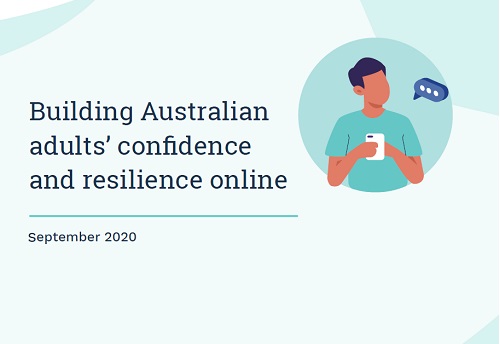Digital confidence — also called digital literacy or digital intelligence — refers to the skills to safely navigate the internet, to critically engage with online information and to effectively manage relationships with others online. As the internet becomes increasingly important in our everyday lives, it is critical that Australians have the confidence, and the skills, to engage safely online.
This research shows that while a sizeable majority of Australian adults are confident in their digital ability to use online technologies, they are less confident in how to manage specific online risks.
The research also highlights that most adult Australians perceive that there are significant risks of harm online and the top three are seen to be scams/fraud, bullying/trolling and the misuse of personal information/images. The majority of adults report that they need online safety information. However, there is a disconnect between the need for this information and people’s actions — only one in ten adult Australians searched for or received online safety information. This is consistent with findings from other eSafety research into parents and young people. It could be that people only seek this information after having a negative experience online. Further research is needed to understand why people don’t actively seek online safety information despite seeing its value, and how to change behaviour so Australians become proactive rather than reactive consumers of online safety information.
Results point to the need for differentiated strategies to encourage engagement with online safety information — a onesize-fits-all approach won’t work. Older Australians and those with disability report the lowest levels of digital confidence and have the greatest perceptions of risk online. In contrast, people who identify as LGBTQI+ report the highest digital confidence of all groups, followed by Aboriginal and Torres Strait Islander peoples. These two groups are, however, also more likely than others to have had a serious negative online experience (e.g. being a target of hate speech) and to be adversely impacted by that experience. These groups also differed in their views on the greatest risks online, emphasizing the need for a targeted education and awareness approach.
Not only do Australians need more information to counter the risks of going online and build their digital confidence — they want industry to do more. The vast majority of Australians agree that technology companies have a responsibility for online safety, but only a minority think that industry is doing enough to integrate safety features into services and products. Most feel that social media companies could do more to address the spread of online hate speech.
This report is the final in eSafety’s series on Australian adults and online safety. Together, these reports show that the online safety support needs of adult Australians differ depending on their levels of digital confidence, online experiences and preferred delivery channels for online safety information. These needs are heightened in situations where people are forced to become more dependent on the internet, such as during the current COVID-19 crisis. With adult Australians intending to continue using the internet for daily activities at current or increased levels even after COVID-19 restrictions are over, the need for support will continue. However, there is a real challenge in turning adults into active users of online safety information. While the majority of adults need this information, few are actively seeking or receiving it. As this research shows, it is vital that adult Australians proactively build their digital confidence and resilience — it is an issue that is not confined to children and young people.

